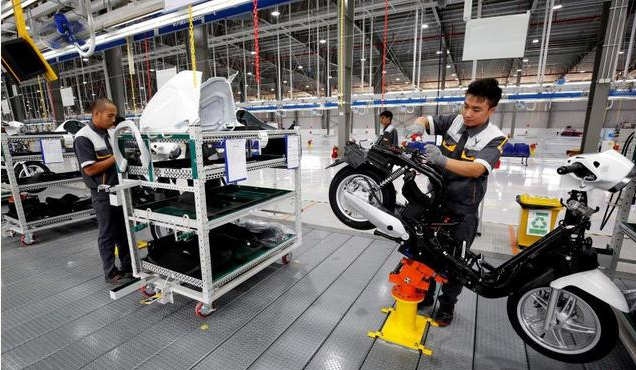[ Dongbo News Comprehensive Report ] Lianhe Zaobao.com of Singapore recently quoted a report from the Japanese Economic and Chinese Network as saying that with the changes in the global trade environment and the impact of the trade war between China and the United States, Southeast Asian countries have an increasing advantage in replacing China as a production base.

Employees assemble motorcycles in a bicycle factory in Haiphong, Vietnam ( Reuters file photo )
The Nikkei News reported that many manufacturers had moved their production lines to Southeast Asia because of rising labor costs in China. The recent Sino - US trade war has accelerated this trend. After the Trans - Pacific Partnership Agreement ( TPP11 ) entered into force at the end of last year with the participation of 11 countries including Vietnam and Malaysia, manufacturers can still enjoy the benefits of tariff elimination, which has even increased the attractiveness of Southeast Asia as a production base.
It is reported that Marubeni, a representative large-scale integrated enterprise in Japan, has planned to invest about 12 billion yen ( about 737 million yuan ) to build a factory in Ho Chi Minh City, Vietnam, to produce corrugated paper ( commonly known as cardboard ).
According to the plan, the factory, which is expected to produce 350,000 metric tons of corrugated paper a year, will be put into operation in 2020 and achieve a sales target of over 20 billion yen ( about 1.227 billion yuan ) for the whole year.
Marubeni believes that manufacturing enterprises gathering in Vietnam are its potential customers. It is reported that South Korea's Samsung Electronics and others have entered Vietnam, so the demand for corrugated paper for packaging electronic products and mechanical parts is expected to increase.
In addition, Fast Retailing, the parent company of Japanese fast fashion giant Uniqlo, will also add sewing factories in Vietnam. Fast Retailing is currently moving its production base from China to Vietnam. According to the list of major cooperative sewing factories of Uniqlo released in March last year, the number of factories in Vietnam was 39, an increase of about 40% over the previous year.
Although China is still the largest production base, the impact of Sino - US trade friction is worrying. Liu Jingzheng, president and president of Fast Retailing, said: " It is somewhat influential, but we can produce in other countries and regions, which is why Vietnam is considered to increase production."
Adastria, Japan's largest casual fashion group, purchases silk threads in Vietnam, Thailand and Indonesia and starts a coordinated fashion production mechanism there. Although the company still relies on China for about 80% of its production, it plans to increase the proportion of production in Southeast Asia to 30% within two to three years.
Japan's Mizuho Institute of Comprehensive Studies estimates that if enterprises move their production base from China to Southeast Asia, Vietnam's GDP will grow by about 0.5%.
Rising labor costs are a major factor in the relocation of enterprises. Data from Japan's Trade Promotion Agency show that the monthly salary of Chinese manufacturing workers was 493 US dollars last year, doubling in the past 10 years. Although wages in Southeast Asia have also risen significantly, Vietnam is only US $ 227 and the Philippines is US $ 220, which is relatively lower than China.
In addition to reducing production costs, large-scale enterprises are also aiming to enter the ASEAN market with a population of 600 million. There are many emerging markets in ASEAN member countries, whose economies are growing at a high speed and have great potential.



